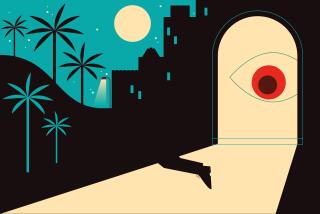Arthur Hailey, 84; Bestselling Author of ‘Hotel,’ ‘Airport’
- Share via
Arthur Hailey, the storyteller who made a fortune using seemingly mundane topics such as hotel management, international banking and snow-packed airports as settings for wildly bestselling, page-turning novels, died Thursday in the Bahamas. He was 84.
Hailey apparently suffered a fatal stroke while sleeping at his home in Lyford Cay on New Providence Island, his wife, Sheila, told Associated Press. He had been in declining health over the last few years after a stroke and heart surgeries.
Hailey wrote 11 books, including “Airport,” “Hotel” and “The Moneychangers,” which have been translated into 38 languages and sold 160 million copies worldwide.
Led by “Airport,” several of his books were made into popular films in the 1970s, creating the genre of melodramatic disaster movies. One of his first stories, a television script called “Flight Into Danger,” became the basis for “Airplane!” which spoofed the genre that Hailey inspired. Hailey, who had sold the rights to the script, told Associated Press that he had “laughed like everybody else.”
Born in Luton, England, on April 20, 1920, Hailey developed his interest in writing in school, but dropped out at 14 after going as far as he could in the country’s free educational system.
He served in the Royal Air Force during World War II, flying patrol fighters in the Middle East and transport planes in India. After the war, he emigrated to Canada, where he worked for several years as the editor of a trucking publication. From that job, he moved into sales promotion and marketing with another trucking firm.
While traveling in a Trans Canadian airliner on business, he began musing about what might happen if the pilot and co-pilot came down with food poisoning and were too ill to fly the plane. Their only salvation, in Hailey’s mind, was one passenger, a rusty World War II pilot who had only flown small, twin-engine planes.
After the flight, Hailey wrote the television screenplay “Flight Into Danger” in about 10 days. He sold it to the Canadian Broadcasting Corp. and his career as a writer began. That script was also made into the movie “Zero Hour!,” which critics called a fine exercise in suspense.
Through much of the 1950s, he earned a living as a writer for shows in the U.S. and Canada such as “General Motors Theatre,” “Studio One,” “Kraft Theatre,” “NBC Matinee Theatre” and the “U.S. Steel Hour.” His most successful script was “No Deadly Medicine,” which became an Emmy award-winning production for CBS’ “Studio One.”
His first novel, “The Final Diagnosis,” about a hospital pathologist who mistakenly causes an infant’s death, was published in 1959. But Hailey didn’t achieve widespread success until 1965, when he published his third novel, “Hotel.”
In that book, he created the template for many of the bestsellers that followed. Set at a fictional hotel in New Orleans over five days, “Hotel” includes plot twists such as a rape, a burglary, a racial incident and a change in management. The book was on the bestseller lists for more than a year.
Writing in Book Week, critic Patricia MacManus said that “Hailey is a pro, no mistake about it -- so much so, he convinced me that signing into a hotel is akin to signing into one of the more active volcanoes.”
Hailey next turned his attention to air travel in the 1968 book “Airport,” where a night at the fictional Lincoln International Airport in the Midwest becomes a multilayered story of marital woes, disabled planes, blinding snow, severe depression in the control tower and a mad bomber on an airborne plane.
“Airport” headed the New York Times bestseller list for 30 weeks and stayed on the list for more than a year.
The star-packed film version included Burt Lancaster, Dean Martin, George Kennedy and Helen Hayes and was the basis for several sequels.
Hailey next took on the auto industry in “Wheels,” and reportedly earned $1 million from his primary publisher, Doubleday, as well as book clubs and a serialization in Good Housekeeping magazine. Corruption and incompetence in the banking industry came next in “The Moneychangers”; an energy crisis in “Overload”; questions of ethics and profits in the pharmaceutical drug industry in “Strong Medicine”; and political conflicts of interest in broadcasting in “The Evening News.” His last novel, “Detective,” was released in 1997 and told the story of a detective hunting a serial killer.
Critical remarks on his novels were often mixed. His painstaking research -- he often took up to a year to investigate a subject, six months to review notes and 18 months to write the book -- was applauded, but the end product was often criticized as cliche-ridden.
However, Anthony Burgess, the author of “A Clockwork Orange,” wrote that Hailey gave readers what they wanted: “When book buyers buy books, they look for sex, violence and hard information. They get these from Arthur Hailey, whose characters discuss problems of hotel management while committing adultery before getting beat up.”
Hailey once explained his success and loyal following:
“It is very obvious that people like reading facts as a background to fiction and this I try to do. It just seems that I have to have the ability to do it, but I don’t strive to be a proselytizer, a crusader, an educator, a consumer advocate. I’m none of those things. I’m a storyteller and anything else is incidental.”
In addition to his wife, Hailey is survived by three children from their marriage and three children from a previous marriage.
More to Read
Sign up for our Book Club newsletter
Get the latest news, events and more from the Los Angeles Times Book Club, and help us get L.A. reading and talking.
You may occasionally receive promotional content from the Los Angeles Times.





